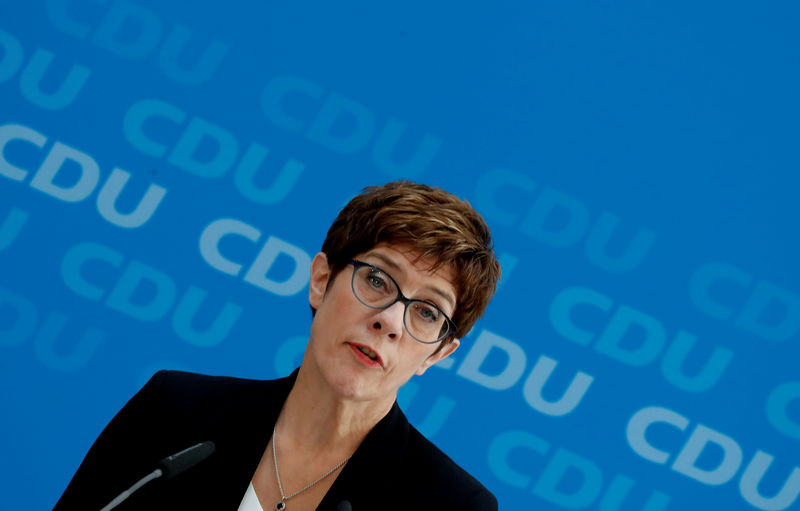BERLIN (Reuters) - The woman in pole position to succeed Angela Merkel as chancellor warned her junior coalition partners against blocking the appointment of a German to head the European Commission, saying this would put their coalition under "maximum strain".
Annegret Kramp-Karrenbauer, head of Merkel's Christian Democrat party (CDU), also kept open the possibility of deploying ground troops to Syria, a policy that would further strain ties with the Social Democrats, who are traditionally wary of German military engagements.
In Sunday's summer interview with ZDF television, Kramp-Karrenbauer said the SPD would be ill-advised to vote in the European Parliament against appointing Ursula von der Leyen as head of the European Commission.
On Monday, European leaders nominated the German defense minister to head the bloc's executive after failing to agree on any of the "Spitzenkandidat" nominees put forward by pan-European parties in European Parliament elections.
Under the 'Spitzenkandidat' principle, the lead candidate of the party with the most seats has a claim on the European Commission presidency.
While Von der Leyen, a close ally of Merkel, is likely to win the confirmation vote in the European Parliament, opposition from the SPD, which is upset at the abandonment of the "Spitzenkandidat" process, could yet cost her the job.
"If Ursula von der Leyen didn't get the necessary majority in the European Parliament, partly because of the SPD's actions, that would be a huge burden on the work of the government and the coalition," Kramp-Karrenbauer said.
Failure to confirm Von der Leyen would pitch European politics into deep crisis - it took three days of haggling for leaders to come up with a candidate with a chance of winning the backing of both leaders and the parliament.
But in Germany, the SPD, which is plumbing new post-war depths in polls as a result of its decision, deeply unpopular with supporters, to prop up Merkel's government, is divided over whether to stay in the grand coalition for another two years.
Many in the party say it would be best advised to leave the government to reinvent itself in opposition, a move that would lead either to a conservative minority government, a new coalition, or fresh elections.
Kramp-Karrenbauer was also open to extending Germany's participation in the anti-Islamic State coalition, including by sending ground troops to Northern Syria as requested by the U.S. government's Syria representative James Jeffrey in an interview with the Welt am Sonntag newspaper.
Kramp-Karrenbauer refused to rule that out, saying she was open to discussing further commitments once Germany's current mandate in the coalition ends in October.

The German airforce contributes reconnaissance jets and air refueling tankers based in Jordan to the coalition against IS and has deployed staff to a training mission in Iraq.